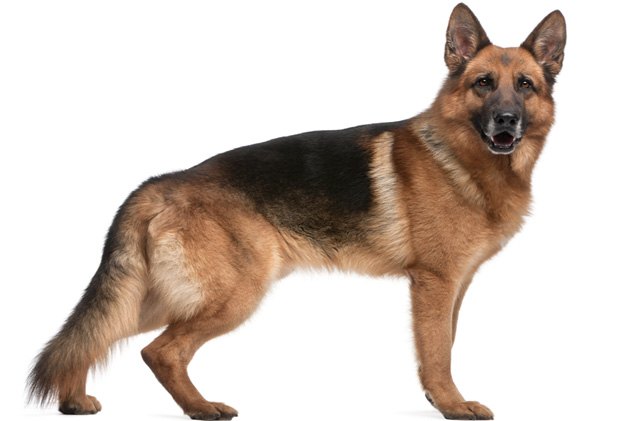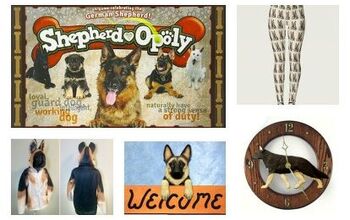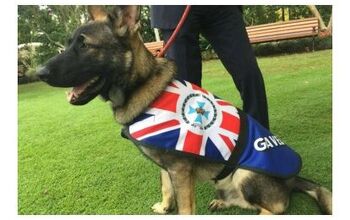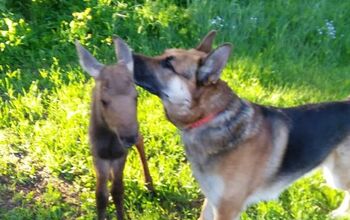German Shepherd


About German Shepherd
As far as we’re concerned, no list of iconic Germans is complete with out a little love for our favorite fury shepherds. That nation has given many gifts to the world, but none compare to the awesome power of the German Shepherd. This isn’t just one of the most popular dog breeds on the market, it’s also one of the best. So, what is it about the German Shepherd that people love so much? Quite frankly, that’s almost an impossible question to answer. There’s just so much to love. It’s not all about the fact that the breed makes great police dogs, though we do adore our four legged pups of the law!
Sometimes known as an Alsatian, the German Shepherd is one of the most renowned breeds of dog out there in the world. German Shepherds are strong, loyal, and are highly responsive to training. Sure, they can often be larger and a little intimidating, but that doesn’t scare people off: German Shepherds are one of the most popular pets in the world. It’s impossible not to fall for these handsome gentlemen of the dog world. They are irresistible.
Thanks to its large size, strength, and ability to behave obediently, German Shepherds are often used for police and military purposes. But what about a German Shepherd separates it from other dogs? As you’re about to learn, the German Shepherd might look like a classic breed, but it is actually a relatively new and unique type of dog. Yes, they do originally hail from Germany, but today German Shepherds are one of the most popular and recognizable dog breeds in the world.
The only question is whether or not the German Shepherd is the right pup to bring into your home. That’s why you’re hear right? To learn everything that you could possibly want to know about owning a German Shepherd? Good. Keep your eyes glued to this page and scroll away. All will be revealed. All you need to do is keep reading.
These dogs are strong, loyal, and are highly response to training.
German Shepherds do indeed get their name from Deutschland, because that’s where the first standard-bred Shepherds appeared. The twist? German Shepherds are actually a relatively young breed, having been fully bred in the 19th century. I’ll bet you didn’t see that coming? This breed is not as old as Germany itself. Instead, it’s a trim 200 years old. Practically a baby.
As efforts were being made throughout the 19th century to standardize dog breeds – perhaps more of an art than a science – German Shepherds grew out of a group of dogs that were good at shepherding. German dog owners bred dogs that were good at rounding up sheep, protecting the flocks, and had strong, swift bodies. To say these dogs were good at shepherding would be an understatement, they mastered the form and set the standard.
At the same time, these proto-German Shepherds often were a great deal different from the Shepherds in other towns and regions in northern Europe. But as enthusiasm for dog breed standardization grew, a man named Max von Stephanitz, a lover of work dogs, found a dog at a dog show that would come to be known as the “first” German Shepherd. He changed the dog’s name to Horand von Grafrath and Horand became the founding German Shepherd. Too few German Shepherds have been granted the privilege of having a “von” in their name since that OG German Shepherd. This needs to be addressed.
So, good news reader! When your child asks you why they’re called “German Shepherds,” you’ll finally have an amusingly direct answer to give them.
If you decide to bring in a German Shepherd as a pet, what on earth will you feed it? They can, after all, grow to be quite large.
German Shepherds can have a healthy appetite and can go through dog food quickly, so using meat to feed your Shepherd (as well as for training purposes) can go a long way in keeping the dog well fed. Mixing in vegetables such as green beans is a great idea. Some people recommend constructing “pies” or “casseroles” of assorted ingredients using meats and vegetables together. Either way, meat and veggies are a sure way to rear a healthy and strong dog. They contain all the important nutrients and vitamins that your pet needs to stay strong, happy, and his coat shiny.
When it comes to dry dog food, keep in mind that a healthy adult German Shepherd can go through some 40 pounds of it in a month. But whether you choose dry food or meat and veggies, keep in mind that any diet will have to be balanced and perfectly measured. German Shepherds are – ideally – strong and muscular dogs, with a powerful frame and plenty of energy. That energy needs to be spent, and the strength maintained – that’s why playtime and running are crucial. But once that is over, food is the only thing on a Shepherd’s mind. So make sure that it’s tasty and in ample amounts!
As always, if you are ever concerned about either establishing or altering your dog’s diet, it’s worth consulting with a veterinarian. While dog food manufacturers and pet blogs provide useful feeding guidelines, they are still just guidelines and won’t necessarily apply to every dog. The only person qualified to determine the specific dietary needs of your personal pooch is their vet. So always check in with a vet before making any substantial changes to what you pour into your pup’s bowl. Good quality food can really make an impact on every part of your dog’s wellbeing.
Thanks to its large size, strength, and ability to behave obediently, German Shepherds are often used for police and military purposes.
One of the reasons Shepherds are so popular with pet owners is that they can be highly obedient. This isn’t to say that there aren’t German Shepherds without behavioural issues, but they can indeed make a great pet if you know how to treat them. Treat a German Shepherd right and you’ll have a loyal friend for life. And if you make the rules clear from the start, your four-legged friend’s understanding will make day to day life so much easier for both of you.
German Shepherds are considered one of the most intelligent breeds of dogs. Some people find that German Shepherds will adapt to a new behavior after only a few repetitions. You’ll even find that a German Shepherd’s obedience and protective nature will make it an ideal guard dog. What is even better, it is a well known fact that these dogs are perfect around children – they can be caring, protective, and gentle! An ideal family dog – through and through.
However, it is important to reinforce boundaries with your Shepherd. Your dog should know the difference between welcome and unwelcome visitors; don’t assume that because your German Shepherd is strong that it can’t be controlled with a little calm and rational training. However, it is important to emphasize positive rewards for good behavior rather than punishment (negative reinforcement is often closer to abuse than training). Training and socialization should begin as early as possible, so don’t let those early and impressionable puppy days go to waste. And remember, always be as safe as possible around an animal the size of a Shepherd. In the end, a positive attitude, a firm voice, and a lot of positive reinforcement can ensure a smooth and fast training period – making the bond between you and your pet stronger than ever!
And what of that size? German Shepherds can weigh up to around 90 lbs when you’re talking about an adult male and up to around 70 pounds for an adult female.
More than likely, your German Shepherd will end up below these “highs.” You should expect a male Shepherd to grow to between 70 and 90 pounds or so, while a female will grow to between 50 and 70 pounds. Of course, there will be a clear difference between a lean and muscular 70 pound dog – and a chubby one of the same weight. Don’t disregard the importance of a balanced diet and plenty of exercise. If you do – you might end up with an obese and unhappy pooch. And that is never good.
In the end, German Shepherds are certainly not the largest dogs you’ll ever see, but they’re big and strong enough to intimidate many people – even if they’re acting perfectly friendly. Of course, their size and weight combined will make them strong, meaning that they can have quite a pull when you are walking them.
German Shepherds can make great pets – and that is one of the key reasons why they are so popular in the United States. But they can also have an aggressive and even protective side. It’s important to never forget that. Still, the patience of this breed is well known – it can take quite a lot for its boundaries to get crossed.
This breed is not afraid to bite small dogs and are known as potential biters of people, as well. There are a large number of German Shepherd attacks, but at the same time, the popularity of the breed itself is a major contributing factor for those numbers, so keep that in mind. Also, the tendency of a German Shepherd to bite can be directly related to lack of training or proper attention from the owner – if you raise your doggo properly, they are certain to be calm and composed.
A psychologically healthy Shepherd will be a self-confident, energetic and active animal – great for people who love to take their dogs out to exercise. German Shepherds are entirely capable of bonding with younger children as long as they are familiar with them. This is why early training and socialization is so important. These dogs have to be raised right in order to thrive with humans.
German Shepherds can frequently suffer from joint problems, including arthritis. Since they are large dogs, German Shepherds can also be dogs with a higher chance of experiencing bloating.
One disease to watch out for is the internal bleeding disease known as Von Willebrand disease, an inherited disorder that has a higher rate among German Shepherds. Since this disease can be inherited, it’s a good idea to check your German Shepherd’s pedigree.
It’s important to maintain regularly scheduled checkups with a veterinarian (especially as your pooch ages into its senior years) to ensure that any potential health issues are identified and treated as quickly as possible.
A lifespan of about 13 to 15 years is normal for dogs the size of German Shepherds. With this mid to high range lifespan, and their lovely temperament, these dogs can be great companions – and friends for a big part of your life.
As mentioned earlier, German Shepherds can be a highly active breed, which means they have a high tolerance (and therefore elevated need) for exercise. With this higher level of activity also comes the aforementioned healthy appetite.
German Shepherds make good exercise companions, especially if you have a large backyard that you can keep to yourself and your family. Exercise is also a great way to help children bond with a dog like the German Shepherd, which is known for its loyalty once it makes these bonds.
It’s important that German Shepherds end up with owners who are able to keep up with their rather intensive exercise demands. If these dogs don’t burn off enough energy through exercise every day, they will find other far less pleasant ways of burning off their excess energy. So keep these exercise demands in mind before committing to these beautiful breed.
The American Kennel Club describes the German Shepherd as “approachable, direct and fearless, with a strong, muscular body.”
German Shepherds have fairly unique coats. They can vary in color and are actually a double coat, the outer of which is shed all year. If a shedding dog is a deal-breaker for you, unfortunately the German Shepherd isn’t your ideal pet.
You’ll find German Shepherds in color combinations such as tan and black and red and black. Some all-black German Shepherds also exist.
As puppies, German Shepherds can be quite cute and will actually have a long “childhood,” which makes them good candidates for potentially growing up with some children and forming the right bonds early in life. Throughout their life, they’ll be active and it will take a good bit of exercise to tire them out.
Photo credit: Eric Isselee/Shutterstock

Amy Tokic, Editor of PetGuide.com, is a passionate animal lover and proud pet parent of Oscar, a Shih Tzu/Chihuahua cross, and Zed, a Japanese Chin. Her love of animals began in kindergarten, when she brought her stuffed dog Snoopy into class with her every day. Now, she writes about her adventures in pet ownership and tirelessly researches products, news and health related issues she can share with other animal enthusiasts. In her free time, Amy loves perusing used book and record stores, obsessing over the latest pet products available and chasing squirrels with wild abandon (a habit attributed to spending too much time with her pooches).
More by Amy Tokic

























